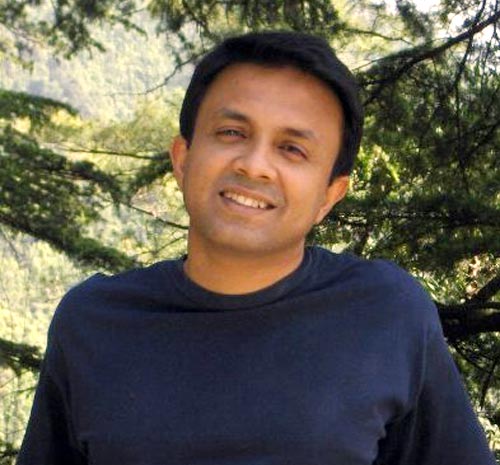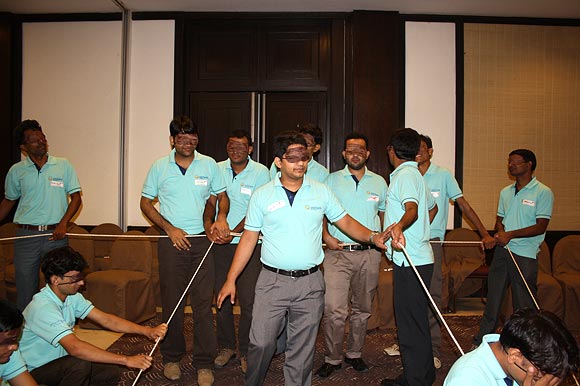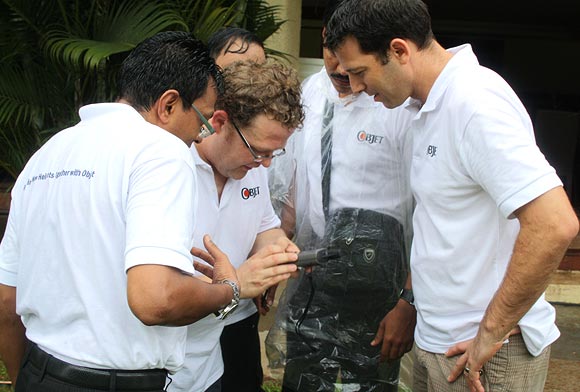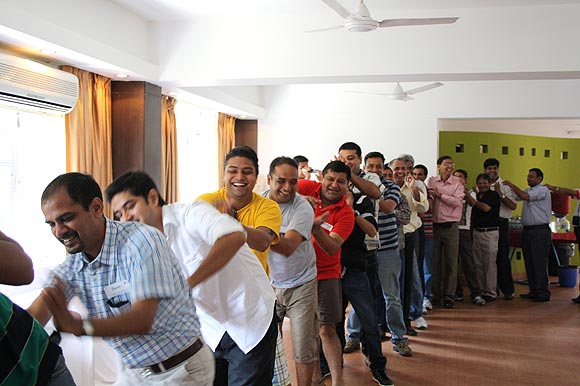
Arun Rao, director of Focus Adventure, an experiential and fun-based corporate learning company tells us why we need to value our colleagues at work and make their lives better, and offers advice on how to build leadership without inducing professional jealousy.
Ever been on a trip with your colleagues and experienced how differently they behave outside the office?
Arun Rao, director of Focus Adventure, a Gurgaon-based experiential and fun-based corporate learning company says character traits of most people are defined by their surroundings.
He also believes that most people do not realise how much their individual character traits affect those surrounding them, unless they are forced to interact in an environment outside the office.
Taking his cue from a conventional office environment, Rao explains, "Most Indian organisations follow the indoor model of working, where work life is mostly confined to your cubicle, your clients, your project or your team. We rarely have much to do with our colleagues outside the office."
At the same time, he says Indian professionals love to work and hence, never complain.
But Rao insists that if you work with an international team of professionals, you will understand why the Indian work culture needs immediate reforms.
While explaining the need for organisations to value employees and improve work environment, Rao said, "Most organisations don't realise that the way our employees behave with and treat each other is very crucial to the way the company will perform. There are so many people who have been working for decades in the same company, without even realising what the core values of the company are."
He says organisations need to address this ignorance seriously and find ways to engage their employees from time to time.An alumnus of the Xavier Institute of Management, Rao's organisation has been involved with various organisations like Hindustan Lever, Nestle, PepsiCo and Barclays, helping them organise outdoor activities that are not only fun and innovative, but also inducing organisational values like leadership, motivation and team-spirit.
In this interview, he tells Divya Nair how in India, we value individual excellence above overall performance, and explains how lack of proper leadership is one of the prime reasons why companies stagnate and fail.
While comparing work cultures across the globe, the young entrepreneur also offers advice on how organisations can motivate employees to build a better team and drive them with optimism to look at the bigger picture.
Please click NEXT to continue reading...

What inspired you to start Focus Adventure in India?
I was working with Hewlett and Packard in India when I got the chance to interact with Focus Adventure in Singapore. When I met the team for the first time over an official intervention, I was fascinated by their working style and the whole idea of inspiring innovations at the work place.
A few months later, when I decided to quit my job at HP, I was deliberating a few options. That's when I met Andrew Chua, who went on to help me found FA later. Andrew suggested that I come to Singapore and work with them for a while, and if I was interested, we could work together.
I worked with FA in Singapore for a few months and realised that although the work environment there was different from what we encounter in India, there was immense scope for a similar model back home. I came back from Singapore and launched FA India in April 2010.
What challenges did you face when you tried to replicate the Singapore model in India?
In the Singapore model, the outdoor activities are devised to rate participants' performances at work.
For example, every project is listed with a set of low-risk and high-risk elements. These elements are basically obstacles that they can possibly encounter during the course of completion of the project.
So, if there is a rappelling or rock-climbing activity, each participant will be rated on how s/he overcomes these low risk and high-risk elements.
When we compared this model to India, we realised why it may not work. Indian professionals are not used to these high-risk outdoor activities. The young professionals may not face a problem, but we had to take into account the concerns of senior professionals who may find sufficient reasons to opt out. If that happens, we would fail in our purpose.
So we had to devise games that were friendly across all ages, and at the same time had something to do with the Indian work culture. That was our biggest challenge.
According to you, what are the common problems faced by Indian professionals at work today?
In India, we attach more importance to individual excellence. Even though we are working in teams, each team is focused on improving the productivity of their respective teams. We are least bothered to find out how and whether we are impacting the overall growth of the company.
What we are actually doing is, we are encouraging teams to work towards different goals, but we are not helping them look at the bigger picture -- the bigger goal. This is where most big organisations fail. We fail to connect individual employee goals to the organisation's goals.
Similarly, many MNCs tend to recruit numerous employees at various levels over a period of time. After a few years, you will realise that even within a team, the fresh lot of employees has different views and opinions and finds it difficult to get along with senior employees. Either due to neglect or for some unexplained reasons, the tension within the team grows to an extent that working as together as a unit becomes a challenge.
Besides these, other common problems employees face is lack of appreciation, lack of efficient leadership, monotony at work etc.

What reasons do you attribute to these problems? How can companies help employees enjoy a better work environment?
The problem of weighing individual excellence over teamwork stems from our education system. Since we were kids, we've always been pitted against one other, from scoring marks to excelling in a competition. But as we grow, we unintentionally apply this to our workplaces as well.
We compare, we become selfish and end up caring only about our gains. This attitude is not only harmful to individual growth but can also lead to stagnation within the team and ignite organisational politics.
In any organisation, it is very important for companies to treat employees as people first. What happens is we work for long hours, neglect our health and realise the importance of family and people only when we fall ill. For instance, one of my colleagues was diagnosed with optic neuritis, a condition where the inflammation of optic nerves may cause a complete or partial loss of vision.
Only after consulting a doctor did he realise how serious the condition was. In fact, he was glad to have been diagnosed at the right time, else he could have lost his vision completely. But that incident taught many of us a very important lesson. When he was recuperating, we realised the importance of one's health and how it impacts the lives of other people surrounding us. In other words, we learn to set our priorities.
Similarly, if we begin to value the people whom we work with, we may not have to wait for a situation like this to mend our behaviour.
What is your opinion about the Indian work culture vs the rest of the world?
I don't know how other countries work, but the work environment in Japan is certainly different from ours. I learnt this through the various workshops we conducted to understand employee behaviour. For example, if you give a certain task to a team of Indians and Japanese, you will be able to spot the difference easily.
The minute you finish explaining the task, the Indian team will spare no time and jump at execution. They may or may not complete it and only if unsuccessful, will consider discussing the task with the rest of the team to find a way out.
Meanwhile, the Japanese team will first come together, discuss, plan a strategy and then execute the task and chances are they will be successful, because they are well prepared and have better coordination within the team.
We've also organised workshops in Bhutan and Sri Lanka. In Bhutan, professionals are very shy and introverted. Besides, an outdoor workshop was a new thing for them. Initially, our team had to struggle to make them communicate with each other.
However, a few hours into the session, they really warmed up and exchanged pleasantries. It was a little achievement, but we were happy with the result. Sri Lanka's work environment is more or less similar to India's, so the work-related problems were also similar.
What training programmes and workshops does your company conduct for employees? And how do they benefit from them?
At FA, we have realised that most of the time, the way employees play games is the way they also work.
So, we devise games that will help us explore these behavioural traits. At the same time, at the end of the workshop, we help them connect with themselves. We ask them questions and enable them to understand how they impact their team and organisation.
We don't judge people, nor do we compare or rate them against one another. Suppose in a particular activity, one participant came across as bossy or reserved, we help him/her understand how such behaviour can possibly affect their career and the people they are working with.
In most cases, participants are not aware of the implications of their behaviour and hence never bother to correct themselves. Games are a fun way of making them come out of their everyday work environment and analyse things differently.

Please share some tips on how to resolve disputes within a team and be a good team player.
The team is only as good as its leader. If you are part of a team, realise the skills and interests of people in your team and understand how you can contribute to the team in a positive way.
If you are leading a team, you have a bigger responsibility. It may be that you were once part of the same team you are leading now. In such cases you have an advantage, because you know your team better than anyone else. While one cannot rule out the possibility of professional jealousy, the challenge is never to give your team mates the impression that you are superior to them.
You have to continue contributing as a team player. A good leader is one who carries his team along with him and stays with them both in success and failure. Your team is your baby and you have to do everything it takes to take it higher. The challenge is to maintain a healthy balance between the new demands of leadership without breaking old ties.
Any advice to motivate professionals who complain about poor appraisals or lack of appreciation at work?
This is a very common problem with most employees across the world. Most of the time, lack of appreciation is unintentional.
We don't realise how important and motivational a simple 'thank you' or 'good job' can sound to the people we work with. It bothers those who have been consistent in their work and been neglected for a long while.
So if you feel you are denied the appreciation for the work you do, get up from your seat, walk up to the person who appraises you and tell them exactly how you feel about that. It may or may not affect how they treat you, but they will definitely learn to respect your hard work and the integrity you put into it.

You quit a well-paying, salaried job to start your own venture. What were the challenges you faced and what advice would you like to give aspiring entrepreneurs?
For me, the challenges were limited because when I started out, I was already married and my wife was there to support me. Since she was working and earned well, the finance part was kind of sorted. That was a huge relief and allowed me to concentrate on my venture better.
To all aspiring entrepreneurs, I would like to say do not waste too much time in analysing and strategising your business plan. It is important to make plans, but a successful start-up is a result of multiple failures and subsequent innovations and improvisations.
So if you really like an idea and believe that it will work, get started immediately. If you have it in you, you will learn to adapt along the way.
There may be some truth behind the saying 'look before you leap'. But if you want to be an entrepreneur, you can't be looking too long. You have to make that leap quicker than anyone else.
Listen to other people, but always remember that nobody had a clear vision when they started. You have to learn to be optimistic. Only then will you survive and live to tell a story.
Illustration: Dominic Xavier